In the 1970s, ecologist David Pimentel introduced me to energetics of agricultural and world systems. Then while at the University of Florida, H.T. Odum piqued my interest. https://www.goodreads.com/book/show/1815769.Food_Energy_and_Society https://www.resilience.org/stories/2005-01-01/prosperous-way-down/
Shortly after these interactions with Drs. Pimentel and Odum, I became aware of similar work (and comparable resultant conclusions) from Texan, Rice University graduate, and (later) world bank economist Herman Daly. More recently Vaclav Smil, Helmut Haberl and Timothy Morton among others have enriched the physical and socio-economic/ecological concepts my little mind attempts to handle (involving the second law of thermodynamics, overshoot, drawdown of the natural resource base, and disparity, and attempts at meeting these challenges) [ 7 Ss / VV->^^ ]. http://dieoff.com/page88.htm https://www.youtube.com/watch?v=rNV0xXy5oSg https://www.springer.com/gp/book/9783319333243 https://orionmagazine.org/2018/09/four-questions-for-the-author-timothy-morton-being-ecological/
In a time with warranted concern over COVID-19, we need to have much more concern over limits to economic growth and the teaching, preaching, and politicking of ecocentrism versus anthropocentrism. I very much appreciated the article by John Cassidy in the February 10, 2020 issue of The New Yorker: “Steady State” https://www.newyorker.com/magazine/2020/02/10/can-we-have-prosperity-without-growth and a subsequent letter to the editor from Peter Schulze of Austin College https://www.newyorker.com/magazine/2020/03/09/letters-from-the-march-9-2020-issue …
“’The faster we produce and consume goods, the more we damage the environment’” … “economists haven’t grasped ‘the synergistic functioning of civilization and the biosphere,’ yet they ‘maintain a monopoly on supplying their physically impossible narratives of continuing growth that guide decisions made by national governments and companies.’”
“’People can flourish without endlessly accumulating more stuff. Another world is possible.’”
“… rather than chase ‘the growth mirage,’ governments should concentrate on specific measures with proven benefits, such as helping the poorest members of society get access to health care, education, and social advancement.”
“John Cassidy’s critique of continual economic growth brings welcome attention to a grave concern of many environmental scientists (“Steady State,” February 10th). He nicely describes the alternative economic approach referred to as “green growth,” which some people believe will allow us to “enjoy perpetual growth and prosperity while also reducing carbon emissions and our consumption of natural resources.” Unfortunately, it seems that green-growth enthusiasts have drunk a more diluted batch of the same Kool-Aid as people who think that conventional growth can go on indefinitely. Perhaps economic growth can be decoupled from carbon emissions, but we still need to deal with invasive species, desertification, and other insults to natural ecosystems. Clever new technologies can help, but efficiency gains are finite and can be overwhelmed when these technologies are scaled up. A longer-term solution may require the slowing, and the eventual reversal, of population growth, combined with a decrease in average individual consumption in richer countries. The latter change will require resisting common marketing tactics. But, once many of us do so, we will suffer less financial stress and will have more time for relationships, leisure, and other delights. After forty years as an ecologist, I believe that the transition to a less materialistic world would be a cakewalk compared with living on a planet with too little photosynthesis.”
[I don’t wish to misrepresent the ideas and proposals of good folk like Howard T. Odum and The Land Institute’s Wes Jackson, but I believe they would agree (or would have agreed in the case of deceased Dr. Odum) that redistribution overtime of humans toward a more labor-intensive agrarian system is preferable to “technologically-fixed“ urban systems.
https://www.resilience.org/stories/2005-01-01/prosperous-way-down/
https://centerforneweconomics.org/publications/call-for-a-revolution-in-agriculture/ ]
………………………
pbm 3/12/20
[ 7 Ss / VV-.^^ ]
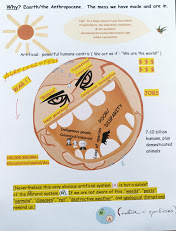
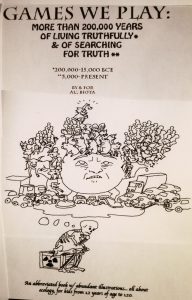
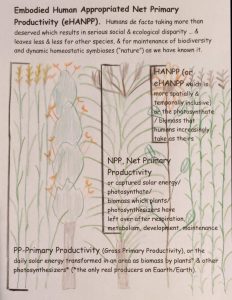
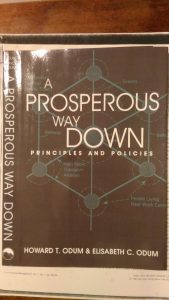
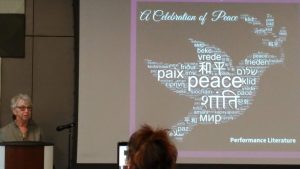
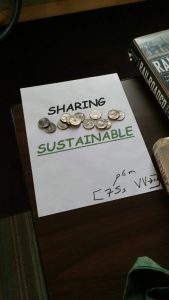
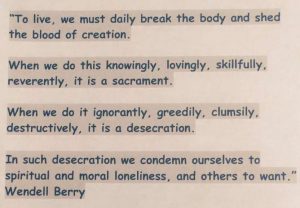
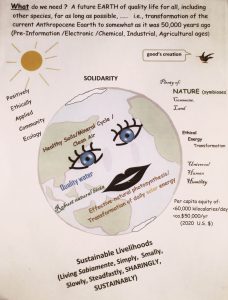
Yesterday in our poetry group we considered the work of Theodore Roethke, whose major theme was the natural organic decay that leads to new natural growth. Regression, then, naturally and personally, as when one bravely revisits scenes in their past. I think you’d like Roethke’s poetry, Paul. Look for The Far Field.
Thanks!
I will plan to do this.